Conéctate con nosotros
Blog
Items filtered by date: Octubre 2023
The Importance of Daily Foot Care
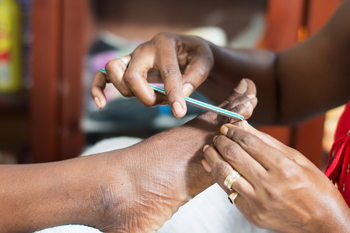
Our feet, often overlooked and underappreciated, are the unsung heroes that support your body every day. They endure a tremendous amount of stress and strain, yet it is common to neglect their care. Everyday foot care is not just a matter of comfort; it is a fundamental aspect of overall well-being. Neglecting foot health can lead to a host of problems, from painful calluses and ingrown toenails to more serious issues like fungal infections and chronic foot pain. Basic daily care involves washing and drying your feet, trimming toenails straight across, and wearing properly fitting shoes. Incorporating foot massages, stretches, and moisturizing into your routine can also enhance circulation and keep the skin supple. By taking a few minutes each day to care for your feet, you can maintain their health, prevent future problems, and ensure that they continue to support you in every step you take. There are a multitude of methods to maintain foot care. If you are interested in learning more about this, it is suggested that you visit a podiatrist who can guide you toward effective foot care techniques.
Everyday foot care is very important to prevent infection and other foot ailments. If you need your feet checked, contact Arthur Segall, Jr., DPM from Segall Foot and Ankle. Our doctor can provide the care you need to keep you pain-free and on your feet.
Everyday Foot Care
Often, people take care of their bodies, face and hair more so than they do for their feet. But the feet are a very important aspect of our bodies, and one that we should pay more attention to. Without our feet, we would not be able to perform most daily tasks.
It is best to check your feet regularly to make sure there are no new bruises or cuts that you may not have noticed before. For dry feet, moisturizer can easily be a remedy and can be applied as often as necessary to the affected areas. Wearing shoes that fit well can also help you maintain good foot health, as well as making it easier to walk and do daily activities without the stress or pain of ill-fitting shoes, high heels, or even flip flops. Wearing clean socks with closed shoes is important to ensure that sweat and bacteria do not accumulate within the shoe. Clean socks help to prevent Athlete’s foot, fungi problems, bad odors, and can absorb sweat.
If you have any questions please feel free to contact our offices located in Plantation, and Ft. Lauderdale, FL . We offer the newest diagnostic and treatment technologies for all your foot and ankle needs.
Understanding the Causes of Sharp Pain in the Big Toe
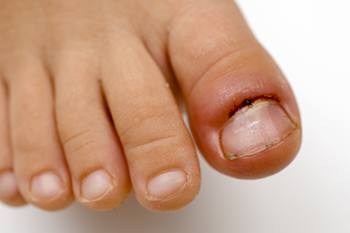
Experiencing a sudden, sharp pain in your big toe can be agonizing and concerning. This discomfort can stem from various underlying causes, each demanding attention and care. One common culprit is gout, a form of arthritis where the excess buildup of uric acid crystals triggers sharp, intense pain in the big toe joint. Nerve entrapment or compression, as seen in conditions like Morton's neuroma, may also cause sharp, shooting pains. Overuse and strain from physical activities can lead to conditions such as turf toe, characterized by ligament damage and sharp pain at the base of the big toe. Ingrown toenails can induce stabbing pain if left untreated. Furthermore, acute injuries or fractures in the big toe can result in sudden, sharp pain. If you are experiencing any pain in your toes, it is strongly suggested that you seek the counsel of a podiatrist who can correctly diagnose and treat toe pain.
Toe pain can disrupt your daily activities. If you have any concerns, contact Arthur Segall, Jr., DPM of Segall Foot and Ankle. Our doctor can provide the care you need to keep you pain-free and on your feet.
What Causes Toe Pain?
Most severe toe pain is caused due to a sports injury, trauma from dropping something heavy on the toe, or bumping into something rigid. Other problems can develop over time for various reasons.
Toe pain can be caused by one or more ailments. The most common include:
- Trauma
- Sports injury
- Wearing shoes that are too tight
- Arthritis
- Gout
- Corns and calluses
- Hammertoe
- Bunions
- Blisters
- Ingrown toenails
- Sprains
- Fractures (broken bones)
- Dislocations
When to See a Podiatrist
- Severe pain
- Persistent pain that lasts more than a week
- Signs of infection
- Continued swelling
- Pain that prevents walking
Diagnosis
In many cases the cause of toe pain is obvious, but in others, a podiatrist may want to use more advanced methods to determine the problem. These can range from simple visual inspections and sensation tests to X-rays and MRI scans. Prior medical history, family medical history, and any recent physical traumatic events will all be taken into consideration for a proper diagnosis.
Treatment
Treatments for toe pain and injuries vary and may include shoe inserts, padding, taping, medicines, injections, and in some cases, surgery. If you believe that you have broken a toe, please see a podiatrist as soon as possible.
If you have any questions please feel free to contact our offices located in Plantation, and Ft. Lauderdale, FL . We offer the newest diagnostic tools and technology to treat your foot and ankle needs.
Managing a Broken Toe
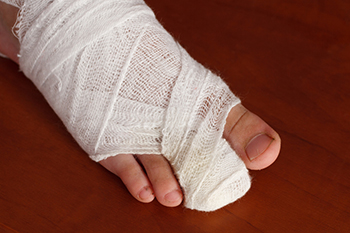
Managing a broken toe can be a painful and inconvenient experience. For stable, non-displaced fractures, an effective method is buddy taping, which is taping the injured toe to an adjacent toe. This provides support and restricts excessive movement, allowing the fractured toe to heal. Another conservative approach to broken toes involves wearing a stiff-soled shoe or a post-operative shoe. This helps protect the injured toe from further trauma and adds stability while walking or bearing weight. In cases where the broken bone ends are significantly separated, a podiatrist may perform a procedure to realign the bones. This is followed by immobilizing the injured toe, through buddy taping, wearing a splint, cast, or a rigid-sole shoe. This is typically done for a period of 4 to 6 weeks. For complex, or severely displaced fractures, surgical intervention may be necessary. In this case, the bones are realigned, and screws, plates, or wires are used to secure them for stable healing. After the initial healing phase, certain exercises can be recommended to enhance toe flexibility, range of motion, and strength, ensuring a more complete recovery. The severity of the fracture and the specific treatment plan may vary from case to case. Consulting a podiatrist is suggested for an accurate diagnosis and personalized treatment options.
A broken toe can be very painful and lead to complications if not properly fixed. If you have any concerns about your feet, contact Arthur Segall, Jr., DPM from Segall Foot and Ankle. Our doctor will treat your foot and ankle needs.
What to Know About a Broken Toe
Although most people try to avoid foot trauma such as banging, stubbing, or dropping heavy objects on their feet, the unfortunate fact is that it is a common occurrence. Given the fact that toes are positioned in front of the feet, they typically sustain the brunt of such trauma. When trauma occurs to a toe, the result can be a painful break (fracture).
Symptoms of a Broken Toe
- Throbbing pain
- Swelling
- Bruising on the skin and toenail
- The inability to move the toe
- Toe appears crooked or disfigured
- Tingling or numbness in the toe
Generally, it is best to stay off of the injured toe with the affected foot elevated.
Severe toe fractures may be treated with a splint, cast, and in some cases, minor surgery. Due to its position and the pressure it endures with daily activity, future complications can occur if the big toe is not properly treated.
If you have any questions please feel free to contact our offices located in Plantation, and Ft. Lauderdale, FL . We offer the newest diagnostic and treatment technologies for all your foot and ankle needs.
Gout Pain Can Be Managed
Morton’s Neuroma Symptoms and Treatment
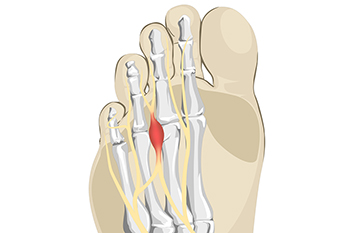
A network of plantar digital nerves in the feet supply sensory signals to the forefoot and toes. Problems arise when these nerves encounter compression, which can occur when the toes are consistently pressed together, effectively obstructing the pathway for these nerves. Such compression often causes a condition known as Morton's neuroma. This may be the result of wearing high heels that force body weight onto the ball of the foot. When the plantar nerves become entrapped, their ability to efficiently transmit signals is affected. This leads to symptoms, including sharp, burning, or tingling sensations in the forefoot and toes. Individuals with Morton's neuroma may also experience numbness or the feeling of having a pebble or foreign object in their shoe. Morton's neuroma can be effectively managed in several ways. Start with footwear that has cushioning and provides adequate room for the toes. Custom orthotics can also help alleviate pressure on the affected area. In more severe cases, corticosteroid injections or surgical intervention may be recommended. If you suspect you are suffering from Morton's neuroma, it's suggested that you make an appointment with a podiatrist for a diagnosis and treatment plan tailored to your needs.
Morton’s neuroma is a very uncomfortable condition to live with. If you think you have Morton’s neuroma, contact Arthur Segall, Jr., DPM of Segall Foot and Ankle. Our doctor will attend to all of your foot care needs and answer any of your related questions.
Morton’s Neuroma
Morton's neuroma is a painful foot condition that commonly affects the areas between the second and third or third and fourth toe, although other areas of the foot are also susceptible. Morton’s neuroma is caused by an inflamed nerve in the foot that is being squeezed and aggravated by surrounding bones.
What Increases the Chances of Having Morton’s Neuroma?
- Ill-fitting high heels or shoes that add pressure to the toe or foot
- Jogging, running or any sport that involves constant impact to the foot
- Flat feet, bunions, and any other foot deformities
Morton’s neuroma is a very treatable condition. Orthotics and shoe inserts can often be used to alleviate the pain on the forefront of the feet. In more severe cases, corticosteroids can also be prescribed. In order to figure out the best treatment for your neuroma, it’s recommended to seek the care of a podiatrist who can diagnose your condition and provide different treatment options.
If you have any questions, please feel free to contact our offices located in Plantation, and Ft. Lauderdale, FL . We offer the newest diagnostic and treatment technologies for all your foot care needs.
Gout and Diet
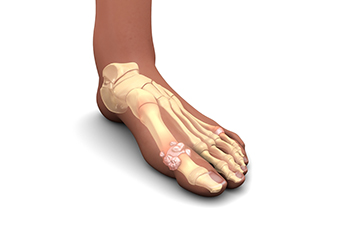
Gout is a painful form of arthritis that occurs when uric acid crystals accumulate in the joints, most commonly affecting the big toe. While several factors contribute to gout, diet plays a significant role in triggering and exacerbating the condition. Uric acid, a byproduct of purine metabolism, can build up when the body produces too much or eliminates too little of it. Certain foods high in purines can trigger gout attacks. These can include red meat, organ meats, shellfish, and certain types of fish, such as mackerel and sardines. High fructose corn syrup, commonly found in sugary beverages, has also been linked to gout. Alcohol, especially beer and spirits, can elevate uric acid levels and increase the risk of flare-ups. To help manage gout, limit purine-rich foods and maintain a balanced diet. Staying hydrated and incorporating fruits and vegetables can help lower uric acid levels and reduce the frequency and severity of gout episodes. If you have had one or more gout attacks, it is strongly suggested that you consult a podiatrist for recommended foods that can help prevent gout.
Gout is a painful condition that can be treated. If you are seeking treatment, contact Arthur Segall, Jr., DPM from Segall Foot and Ankle. Our doctor will treat your foot and ankle needs.
What Is Gout?
Gout is a form of arthritis that is characterized by sudden, severe attacks of pain, redness, and tenderness in the joints. The condition usually affects the joint at the base of the big toe. A gout attack can occur at any random time, such as the middle of the night while you are asleep.
Symptoms
- Intense Joint Pain - Usually around the large joint of your big toe, and it most severe within the first four to twelve hours
- Lingering Discomfort - Joint discomfort may last from a few days to a few weeks
- Inflammation and Redness -Affected joints may become swollen, tender, warm and red
- Limited Range of Motion - May experience a decrease in joint mobility
Risk Factors
- Genetics - If family members have gout, you’re more likely to have it
- Medications - Diuretic medications can raise uric acid levels
- Gender/Age - Gout is more common in men until the age of 60. It is believed that estrogen protects women until that point
- Diet - Eating red meat and shellfish increases your risk
- Alcohol - Having more than two alcoholic drinks per day increases your risk
- Obesity - Obese people are at a higher risk for gout
Prior to visiting your podiatrist to receive treatment for gout, there are a few things you should do beforehand. If you have gout you should write down your symptoms--including when they started and how often you experience them, important medical information you may have, and any questions you may have. Writing down these three things will help your podiatrist in assessing your specific situation so that he or she may provide the best route of treatment for you.
If you have any questions, please feel free to contact our offices located in Plantation, and Ft. Lauderdale, FL . We offer the newest diagnostic and treatment technologies for all your foot care needs.

